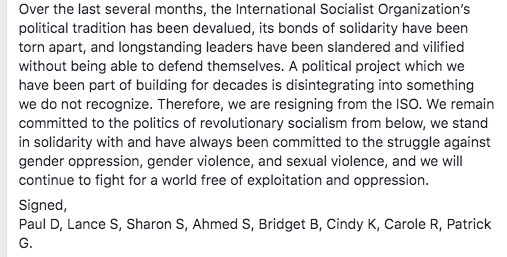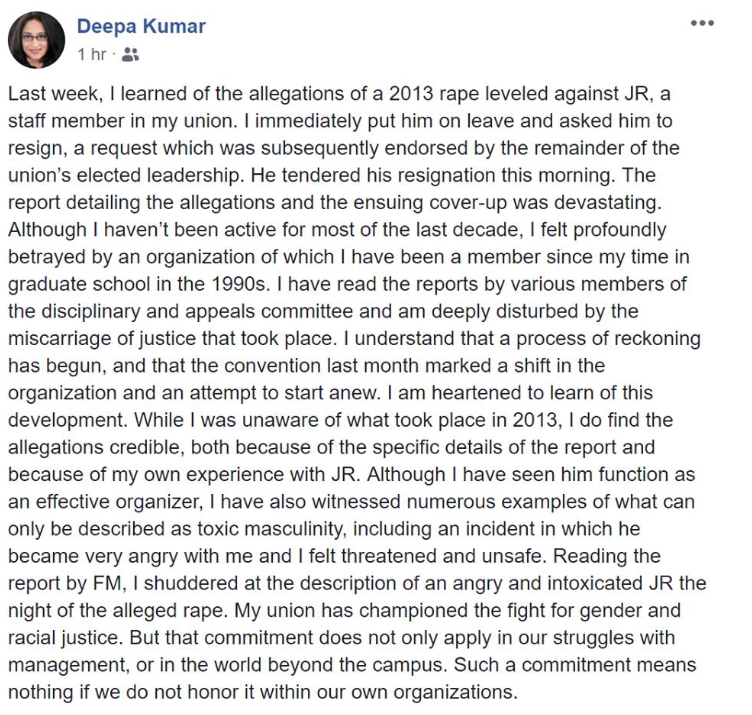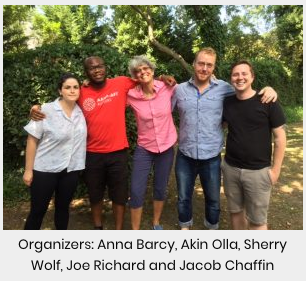Why did the ISO implode so quickly, especially when the new leadership took many of the right steps to deal with the grenade that was dropped in their laps?
... ISO LeaksI hope this ISO Leaks person is not taking asyslum in some embassy. Lots of stuff coming in from the left with a lot of insight and providing a deeper understanding for insiders like me as to how ISO operated in MORE.
I've heard long-time leftists wonder why some of the smart people they meet from ISO would chose to be in an organization - in some cases for their entire adults lives (many are recruited in college) which has had the same people on steering committee for 35 years. ISO leaks reports:
As far as anyone knows, the ISO’s last competitive SC election was in 1983 when the group’s founding leaders, Cal and Barbara Winslow, were ousted in an effort driven by the British Socialist Workers Party — then the ISO’s “mothership.” Ahmed Shawki and Sharon Smith were installed in the Winslows’ place on the SC where they (and a handful of close allies like Paul D’Amato) would remain for the next 35 years.
Michael Fiorillo, one of the ICEUFT founders and a life-long independent socialist comments:
it’s the Leninist/Vanguardist thing that’s in their DNA, combined with their bourgeois backgrounds/organizing strategies, which make them incapable/uninterested in actually talking with people who are different from them (as in, working people), the resulting insularity (always an occupational hazard on the Left) and a how-many-revolutionaries-can-dance-on-the-head-of-a-pin kind of scholasticism...
While many left articles give credit for people inside ISO for pushing for reforms, they went along with a top-down fundamentally undemocratic organization which dictated policy from the top which was carried out by the apparatchiks in ISO in their union work which often engaged in attempts to suppress dissent in their caucus work - just as dissent was suppressed in ISO for 4 decades. The leaf doesn't fall far from the tree.
Why is this stuff important? Because the ISO faction in the UFT which has not always been a constant as new people kept showing up as others left, has played a major role in opposition politics. Thus I will be posting many articles and making the links to UFT politics. The refusal to run with other caucuses is directly related to the ISO decision making policy. I will expand in future articles.
https://medium.com/@isoleakss/
The story of precisely how and why the International Socialist Organization (ISO) decided to dissolve itself
just shy of the 42-year anniversary of its founding in April 1977
remains something of a mystery to those outside its ranks. Perhaps this
is because the group’s members themselves have not been able to fully
understand, process, and make sense of the events that undid almost four
decades of effort in just under two weeks. Perhaps they have been too
busy living the crisis and the attendant traumas to write about what
happened in a way that outsiders can comprehend.
Yet
the lessons of the ISO’s demise are too important to remain a mystery,
particularly given Democratic Socialists of America’s (DSA) ongoing #MeToo problems.
Earlier
this year, the ISO’s annual convention passed historic organizational
reforms and elected a national leadership (the Steering Committee or SC)
of 21 people, the majority of whom had never served on the body before.
This was unprecedented. As far as anyone knows, the ISO’s last
competitive SC election was in 1983 when the group’s founding leaders,
Cal and Barbara Winslow, were ousted in an effort driven by the British
Socialist Workers Party — then the ISO’s “mothership.” Ahmed Shawki and Sharon Smith
were installed in the Winslows’ place on the SC where they (and a
handful of close allies like Paul D’Amato) would remain for the next 35
years.
In
the year leading up to the ISO’s February 2019 convention,
dissatisfaction with the organization’s internal regime and external
practice became so widespread that the Steering Committee itself became
divided into a pro-reform majority and an anti-reform minority centered
around Smith, Shawki, and the 1980s old guard. So many resolutions and
discussion pieces were submitted to members-only pre-convention
discussion bulletins over a six-month period that the final result was
45 volumes amounting to nearly 1,200 pages.
It
was during the pre-convention period that the Steering Committee voted
on December 16, 2018 to fundamentally change the way SC elections would
be conducted. The old system in which a single list or slate of a dozen
or more SC candidates was chosen by majority vote at the convention (a
winner-take-all system encouraging ideological homogeneity) was scrapped
in favor of electing members of the SC as individuals, ensuring that
the ISO would be run by its most popular members regardless of their
particular ideological slant. This new system produced the first
multi-tendency leadership in ISO history: 21 individuals from three
different platforms — Independence and Struggle, SC Majority, and Socialist Tide, Revolutionary Current — were elected to the new SC (as well as some individuals who adhered to no platform).
Unbeknownst
to the vast majority of the organization and most but not all of the
new Steering Committee, one of those newly elected to the national
leadership on the Independence and Struggle platform, Joe Richard, was found guilty
of sexual misconduct and rape by an internal ISO investigation in 2013.
The results of that probe were covered-up by the 2013 SC and
whitewashed by a second, rigged investigation
orchestrated by the 2013 SC. After learning that Richard was elected to
the ISO’s highest decision-making body, an ex-ISO member who led the
original investigation notified the new SC about the rapist in their
midst by sending them and non-ISO allies a 20-page email full of evidence on March 11.
This
bombshell blindsided and derailed the new Steering Committee which was
busy implementing a new system for membership dues, putting together new
bodies like a #MeToo working group and a people of color caucus
(another first in ISO history). A storm of recriminations, expulsions,
resignations, and suspensions ensued:
- Joe Richard was promptly removed from the SC.
- Keenga-Yamatta Taylor who was on the 2013 SC resigned on March 13.
- Sharon Smith, Ahmed Shawki, Paul D’Amato, and Lance Selfa who had served on the SC since the 1980s quit the organization.

- Steering Committee member Alan Maass accused fellow SC member Joel Geier of aggressively lobbying for Joe Richard on the 2013 SC which Geier hotly contested before resigning a few days later.
- All 2013 SC members were suspended from leadership positions at various levels of the organization.
- A long-time ISO member filed a 10-page #MeToo complaint on March 17 detailing years of emotional abuse and manipulation by Shawki who was effectively her boss.
- Entire branches began disaffiliating.
- Hundreds of leading and rank-and-file members quit.
To
the new SC’s credit, they informed the membership of the scandal on
March 13 via email and went public with what happened in the ISO’s
newspaper Socialist Worker on March 15
(although they withheld the ex-member’s letter containing the evidence
of Joe Richard’s guilt, nor did they name Joe Richard or anyone involved
in the cover-up in statements published since). Socialist Worker also failed to report that Richard was suspended from his position as an organizer
with Rutgers American Association of University Professors and American
Federation of Teachers (Rutgers AAUP-AFT) after word got out about the
2013 incident. Richard quickly resigned after his suspension.


By
the time a national conference call on March 24 to discuss proposals
about the ISO’s future was held, resignations had shattered the
organization. The group’s nominal membership of 980 (January 2019) fell to under 500 judging by the number of members and ex-members who voted in the week-long straw poll that followed the March 24 call.
Why
did the ISO implode so quickly, especially when the new leadership took
many of the right steps to deal with the grenade that was dropped in
their laps?
The
ousting of the SC old guard was years in the making. Rising
frustration, anger, and resentment at all levels of the organization
finally boiled over and ISO members looked forward to something of a
fresh start and a new way of doing things coming out of the February
convention. Instead they were forced to deal with the worst scandal in
the group’s history — a shocking rape and six-year-long cover up
perpetrated by the members of the new SC from two out of three reform
platforms. The revelations raised disturbing, unanswered questions:
- What other rapes or crimes were covered up by the old leadership that no one blew the whistle on?
- Why did Joel Geier lobby so vociferously on Joe Richard’s behalf, particularly when others accused of similar crimes were summarily expelled without any due process?
- Did Joel Geier’s $10,500 donation to the ISO’s nonprofit — the Center for Economic Research and Social Change — in 2013 have anything to do with him successfully swaying the 2013 SC to his point of view on the Joe Richard case?
- Did Joel Geier and Joe Richard know each other prior to the 2013 rape case or after, given their collaboration on a Marxist Internet Archive project that same year?

The 2013 SC’s cover-up was the straw that broke the ISO’s back but it was objective conditions — principally the rise of #MeToo and the rebirth of the American socialist movement inside the “graveyard of social movements”
i.e. the Democratic Party — that caused the ISO’s membership to
question and eventually reject old methods, old habits, and old leaders.
Reforming the way the Steering Committee was chosen allowed Joe Richard
to ascend to the top of the ISO which in turn triggered someone to blow
the whistle on him. People quit in droves when the new and improved
ISO — more democratic, more outward, more struggle-oriented— quickly
turned out to be steeped in scandal and iniquity.
So what lessons can activists and organizers take from the ISO debacle?
1. Don’t do cover-ups. Also, don’t rape, sexually assault, or otherwise abuse people.
This should go without saying but it’s worth reiterating anyway given the ubiquity of sexist abuse. No organization can ever be completely be free of criminal or anti-social behavior forever, but once people become aware of such acts, covering it up is exactly the wrong thing to do.
2. Volunteer organizations are not equipped to investigate violent crimes with the aim of finding people guilty or innocent.
Joe Richard is lucky his accuser did not go to the police. The ISO is lucky none of their members (at least according to written documents) told the accuser or witnesses not to talk to the police since such acts could amount to witness tampering or obstruction of justice.
1. Don’t do cover-ups. Also, don’t rape, sexually assault, or otherwise abuse people.
This should go without saying but it’s worth reiterating anyway given the ubiquity of sexist abuse. No organization can ever be completely be free of criminal or anti-social behavior forever, but once people become aware of such acts, covering it up is exactly the wrong thing to do.
2. Volunteer organizations are not equipped to investigate violent crimes with the aim of finding people guilty or innocent.
Joe Richard is lucky his accuser did not go to the police. The ISO is lucky none of their members (at least according to written documents) told the accuser or witnesses not to talk to the police since such acts could amount to witness tampering or obstruction of justice.
3. Volunteer organizations have a duty to protect members and the people they work with from abusive behavior.
While
political organizations cannot conduct professional investigations and
do not have the scientific and technical expertise to deal with forensic
evidence, protecting or tolerating abusers means putting everyone who
comes into contact them at risk. Since volunteer organizations are not
courts of law and cannot deprive people of property or liberty,
evidentiary standards used to guide disciplinary decisions must
different (preponderance of evidence versus innocent until proven guilty
beyond a reasonable doubt). The punishments a volunteer organization
can mete out — censure, suspension, expulsion — are far less devastating
to an individual than jail time or fines and there should be far less
reluctance to resort to punitive measures when interpersonal conflicts
arise.
When
an investigation is warranted, a third party (preferably a law firm)
should be retained to conduct an inquiry to avoid conflicts of interest
and the appearance of bias (organizations investigating themselves and
leaders in charge of looking into their friends have a funny way of
finding no wrongdoing). In 2013, the the Steering Committee never
retained an attorney to deal with a potentially criminal matter yet the
ISO’s nonprofit took in $1.7 million so clearly funding difficulties had little to do with this decision.
4 comments:
Good riddance! Sadly, I fear this cult will be back in some other zombie form.
While what happened is regrettable, it is in no way surprising. I was active with the ISO throughout the mid/late noughts, and saw firsthand how the leadership was basically a social club unto themselves, well-insulated from any sort of criticism or accountability. After witnessing an incredible amount of BS within the organization, I parted ways with it in 2010. It's a shame that the ISO couldn't clean up its act well enough to save itself, because the organization was more than capable of doing good work when it wanted to. Oh well...
A few lessons, I think, that affect the conversation in NYC:
1. The lengths that the ones in power at ISO would go to to not lose or share that knows no bounds. This was the case w MORE as well. I know you don't make this claim, but I will: It seems pretty clear that the folks in charge over there lost full control of the group, and arranged for a bomb to be dropped on the new SC that, eventually, helped implode that group. That's how far they will go: They would rather kill the group than share any actual decision-making power and be democratic. I think the weird MORE nonsense is consistant with that committment. They have also absolutely shown a greater committment to holding onto power than they have to social justice: As soon as it looked like parental leave would become a reality, people in the group shouted it down and changed the mantra to 'paid family leave' calling parental leave not enough. Of course, someone who was not them (and who was later purged) was the ppint person on that process. As soon as it looked like we might get Tweed to agree to appoint 'point person' about immigrant issues in every school (again vocally pushed by someone who was not them) they moved the goal posts and demanded an end to the entire policing philosophy of broken windowss -and insisted we work only on that for a major event that was being planned.
It's really after reading these documents when it becomes clear that it was never really about family leave or broken windows; it was about maintaining group control -at all costs.
And, of course, they purged just weeks after losin control of their own steering committee. That is a very similar action to ISO.
2. Also, there were people associated with MORE here in NYC who played a role in covering up their scandal. I did notice you didn't touch on that (I'm not sure they'll give you o credit for no touching on that, but I did notice).
The "moving of goalposts" shouldn't be surprising to anyone. After all, the ISO was primarily a Trotskyist organization, and one of the greatest flaws of Trotskyism is its theory of permanent revolution. Because "permanent revolution" can never be satisfied, any achievements won are quickly tossed aside in order to direct energies into whatever the new (and more fashionable) struggle is. By continually tossing aside hard-won victories, Trotskyists deny themselves the foundation necessary to build, grow, and prosper. Whether they want to admit to it or not, this makes them fall prey to an ever creeping nihilism. And as can be seen with the ISO, self-cannibalization is almost always a recurring outcome. Again, this is unfortunate but not unexpected.
I am not familiar with the situation regarding MORE as I am not (nor have I ever been) in the NYC sphere of influence. My experiences with the ISO are a direct result of my time spent with the organization while living in Chicago and Pittsburgh, as well as my participation with organizational efforts throughout the greater midwest/rustbelt.
Post a Comment